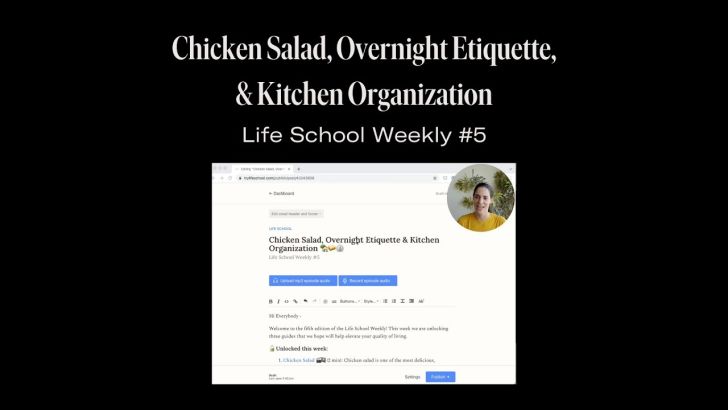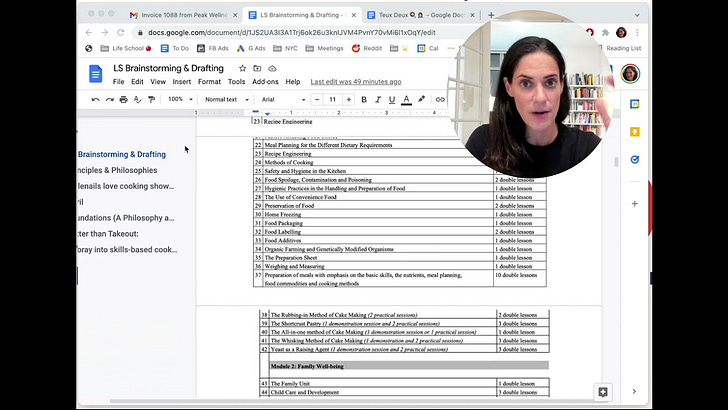This guide is 2,748 words, a 10 min 59 sec read time (19:33 minute listen). Subscribe here.
📍Introduction:
Whether seeking marriage or simply a romantic encounter, a dater armed with etiquette has a higher chance of success. Etiquette refers to the customs and guidelines that help people act with more sensitivity towards others. Contrary to popular belief, etiquette in dating is not outdated, nor is chivalry dead. Both, however, have evolved in the modern era. From swiping to snuggling, let these tips & tricks inspire you to elevate your game.
📝Notes, Tips & Tricks:
General Principles:
Dating shares the same word root as data. Approached through this lens, dating is a "data-gathering activity" that allows two people to learn about one another & explore whether or not they are romantically compatible. There's no need for high expectations, build-up, or pressure. You're just getting to know someone.
Dating goals can vary widely (e.g., practice for marriage, fun, personal growth). If you have strong preferences (e.g., for something casual, something serious), it’s best to state that pretty soon. Regardless of your ambitions, however, remember that people can be easily hurt. Treat others the way you want to be (or you think they want to be) treated.
It takes two to tango. This goes for both positive and negative experiences. If the date (or relationship) goes horribly, it is typically not one person's fault. If it goes well -- same story.
It's best to approach & treat people as individuals. Believing that "all women are x" or "all men are y" can lead to false negatives (aka type II errors) and aloof behavior.
Asking Out & Being Asked Out
When asking someone on a date, be specific (e.g., "Would you like to go for coffee this weekend?"). General questions can be hard to answer (e.g., "What are you doing this weekend?")
If you're the one asking for the date, give as much detail as possible (e.g., time, place to meet). Waiting until the last minute to pick a spot or time can make it difficult for your date to plan accordingly (e.g., clothing, transportation, scheduling).
If you are asking someone out, it is typically assumed that you will pay. However, this can vary by wealth levels and cultures (e.g., in Europe splitting the bill is more common). If you suggest the place, it's nice to at least offer to cover the bill. Choose something less pricey if you are on a budget (see dating budget reference guide below).
Relatedly, if you are the one being asked out, don't suggest a more pricey option. It could make your date feel uncomfortable & pressured.
When asking someone out, double-check to ensure it aligns with their interests (e.g., don't book rock climbing without confirming your date isn't afraid of heights)
If booking a restaurant with someone new, it's polite to ask about dietary restrictions. Relatedly, if you have strict food preferences or allergies, let your date know in advance.
Don't cancel a date unless absolutely necessary. Scheduling and rescheduling a date over and over is unromantic, irritating, and can send the message that you aren't interested and/or reliable.
Don't cancel on pre-existing plans to accept a date. It's rude to cancel on someone for a better option. Suggest meeting at a different time.
Don't give false hope if you have no interest (e.g., I can't because I'm very busy with a work project right now"). Also, don't lie. It can come back to haunt you.
Talking/Texting/Communicating
Daters differ on their willingness to talk, text, or video chat before meeting in person. If you have strong preferences, share them. Be flexible.
Many people these days prefer to have some form of verbal communication (e.g., zoom/facetime, phone call) before meeting in the real world. This is a new norm. Embrace it! It can save you a lot of time and money.
Tangentially, too much texting before meeting in real life can lead to a loss of momentum. It can also result in misinterpretations or projections.
It is customary but not required to touch base (e.g., text, call) before a date to confirm details. If you are the one planning the date, try to do so the night before if possible. It creates a sense of anticipation and gives your date plenty of time to prepare.
Preferences around grammar and punctuation differ. Matching your date's style is the best bet for harmonious text communication.
Ghosting (not returning someone's text or call) is very rude & can leave someone hanging on without closure. If you aren't interested, thank your date for the time together and decline their offer. (See Ending Things Nicely below)
Honest, direct communication can help avoid a lot of confusion & heartache.
Sharing your feelings can go a long way. Nobody is a mind reader, and honestly stating what you are experiencing can go a long way in providing clarity. For inspiration, check out the Feelings Reference Guide below. If your feeling statement has the word "that" or "like" in it, you likely aren't speaking of your feelings (e.g., "I feel that/like you always do X" is a thought, not a feeling).
In the beginning (e.g., first 1-3 dates), it's typical for one person to take the lead in proposing dates and the other to follow by accepting or rejecting. If the lead is interested, they will ask for a second date. If you want to (co)lead, ask for the second date!
Texting frequently between dates can hinder the romance associated with anticipation (e.g., "A relationship rarely dies of starvation, yet often dies of indigestion."; "Absence makes the heart grow fonder.”)
On the Date:
Make every effort to be on time. Nobody likes to be kept waiting. Additionally, tardiness implies you value your time more than your date's. If possible, arrive a few minutes early. Running a few minutes behind? Call (and apologize.)
When picking up a date, it's polite to go to their door & ring the doorbell. Don't wait in the street or honk.
If driving, tidy the car. If there are crumbs/dirt inside, vacuum. Don't arrive low on gas (or electricity).
Holding doors open, allowing your date to exit the elevator first, or helping someone into their chair are chivalrous but not required. If you feel the desire to try these activities but are unsure, ask for permission. If someone opens the door for you, thank them.
When strolling on the sidewalk, walking on the side closer to oncoming traffic can be seen as an act of protection.
If walking, try to match the pace of your date.
When picking seats at a table perpendicular to a wall, it is traditional that whoever faces the wall signals their lack of interest in scanning the crowd (e.g., for alternative date options).
Don't order for your date unless they indicate that preference.
Try not to check your phone while on the date. It can send the message that you are bored.
Many people advise against discussing politics, religion, marriage, exes, children, or money on the first few dates. However, if one of these topics is important to you, it’s worth sharing early on (e.g., dates 2-5) rather than down the road. If there are deal-breakers on the table, better to find out sooner rather than later.
Table manners will help you avoid disgusting your date (e.g., don't chew with your mouth open or talk with a mouth full of food, try not to eat too fast).
Don't get drunk on a date. You may think you're charming, but you are likely to look sloppy and say (or do) something you regret.
Show an active interest in getting to know your date (e.g., ask questions and refrain from monopolizing the conversation). However, don't pepper your date with questions and refuse to open up. Dating should be a two-way road.
Don't interrupt your date. Additionally, avoid constantly interjecting with "uh-huh" or "yeah" as they speak. It's distracting and can send the message you are trying to speed them up.
Life is long, and the world is small. Due diligence (both in hiring and dating) is common practice now. Treat others as you would like to be treated (and remembered or spoken of down the line).
It is typical (& courteous) to walk or drive your date home. It shows that you care about your date's safety & wellbeing. Alternatively, you can wait until their transportation arrives. For next-level generosity, hail the rideshare from your phone and cover your date's journey. This ensures you know your date arrived home safely.
If you had a lovely time on the date, express your thanks graciously (e.g., I had such a great time, would love to see you again"). Had a really great time? Express thanks both in person and with a follow-up text the next day.
Grooming & Dressing
Don't wear clothing that may distract you. If you feel uncomfortable (e.g., too warm/cold/itchy/squeezed), you may appear nervous. Try to dress comfortably so your best self can shine through.
Showing a lot of skin can distract your date, making it difficult to focus on a meaningful conversation. Also, it reduces the mystery & intrigue of what might come later.
If you hope to touch your date, ensure your nails are clean and filed smooth.
Bad breath is a major turn-off. Smell your floss. If it stinks, so does your breath.
Body odor is avoidable & easily deterred with light deodorant or antiperspirant. Go easy on the scented type as it can smell like car freshener.
Relatedly, while a bit of scent can be nice, overpowering smells may turn off your date. Go light on the cologne/perfume. 1-2 spritzes are generally sufficient.
If you think there will be walking, wear shoes you can walk in.
Physical Romance:
When exploring physical chemistry, consent (ideally enthusiastic) is required. If you sense hesitation from your date, pause. If you doubt your ability to read body language, go slowly.
When in doubt, ask your date (e.g., would you like (for me) to XYZ?)
If you aren't sure whether or not you are romantically interested in someone, consider getting to know them as a friend first. A true romance typically blooms naturally.
It is your duty to disclose anything that could affect your partner's health.
If you don't feel comfortable discussing topics related to safe sex (e.g., STDs, testing), reconsider if you are ready to get physical.
It is entirely acceptable to require a test before engaging physically with your date.
Don't lie (e.g., signal interest in something serious if you aren't).
PDA can make others around you feel uncomfortable. With that said, if a special moment arrives, embrace it. (See this video for inspiration)
Ending Things Nicely
If you end a dating relationship with kindness and grace, you open up new opportunities for yourself (e.g., starting a friendship, being introduced to one of their friends).
Ending a date early is generally considered rude & will likely hurt your date’s feelings. However, if you are genuinely uncomfortable or have been hurt in some way, it is acceptable to depart early (e.g., after dinner & before dessert).
If someone asks you for another date and you don't want to accept, be gracious and thank them. Then turn them down nicely.
Do not lead people on. It's cowardly & selfish.
When ending things, don’t lie. Lies are unethical and can brand you as a “liar” if caught.
If you end something and are sincere about staying friends, let some time pass and follow up with a friendly invitation.
If the timing is off, be upfront (e.g., "Thank you for asking me out. I would like to but [insert timing-related issue here]. Would it be okay if I reach back out when things change?")
Sample rejection verbiage: "I see this more as a friendship than something romantic"; "I've recently started seeing someone, but thank you."; "I don't think we have enough chemistry."; "I am sorry, but I have a rule to never ___."; "Something is missing."; "The timing isn't right."
Accepting Rejection With Grace
If someone turns you down, accept it graciously. If, however, you think your rejector has made a grave mistake, it's acceptable to ask for another chance.
It is acceptable to ask for feedback if you can abstain from becoming pushy or defensive.
Remember that the right guy/gal won't let you get away, there are many fish in the sea, and dates are like streetcars. If you miss one, another one’s on the way.
Learning to accept rejection is a part of life. Try not to obsess or take it too personally. It's their loss. Let your friends be there for you.
Dating App Profiles
Pictures should be equal parts "accounting" & "marketing." Market your strengths (e.g., high-resolution photos in good lighting) and account for who you are (e.g., recent photos that don't hide your face or body).
Don't lie about your age or height. (Rounding up half an inch is permissible.)
Avoid group photos if at all possible. They require an additional mental load for your prospective date (who likely has swiping fatigue). You may think you look dissimilar from your friends. On a 3x3 inch image, it's often hard to tell.
Answer questions in a way that helps someone get a sense of your personality. Sharing that you relish widely popular food/activities/music is unlikely to differentiate you from others.
Don't be afraid to ask a friend or family member for help. Sometimes we aren't the best judges of our strengths and quirks.
Introducing others:
If you want to set two people up, it's best to ask both their permission beforehand, separately. If one person tends to be pickier than the other, ask that person first. Show a picture and make a quick pitch. If they aren't interested, let it go.
One easy way to introduce people to one another is to create a scenario where they can meet naturally, in person, in a group setting (e.g., invite them both to an event or party)
Introducing people is a great way to put positive karma into the world.
Dating & Money:
In theory, the person who initiates the date signals their intent to pay. This goes for suggesting an addition to a date underway as well.
It’s polite to at least offer to split the check. Most likely, your offer will be refused (at least on a first date). If you strongly prefer to pay, kindly explain that.
If someone pays for you, thank them.
Some more traditional types will prefer to pay/be paid for the first few dates. This is something worth discussing if it makes you uncomfortable one way or the other (e.g., "how do you think/feel about paying for dates?")
The early stages of dating often transform as a couple builds more trust and talks through preferences around spending money. Do not assume that what happens on the first few dates will be set in stone.
Paying for a date should not correlate with any romantic outcomes.
If eating at a restaurant and the menu is expensive, try to pick something in the mid-price range or look to your date for guidance (e.g., mimic their general approach).
Splitting the check early on (e.g., the first three dates) can be read as a lack of romantic interest — signal at your own risk.
📓Dates by Budget Reference Guide
$: walk/hike, coffee/tea, phone call/video chat, local park, museum, volunteering
$$: brunch/lunch, movie, drinks, picnic, host for dinner
$$$: out to dinner, cultural event (e.g., show, concert)
$$$$: trip/vacation
📓 Feelings Words Reference Guide:
Do you struggle to talk about feelings? Here are some words to help guide/inspire you.
Happy: relaxed, calm, playful, silly, delighted, spontaneous, amused, optimistic, joyful, excited, satisfied, content, confident, charmed
Anger: annoyed, aggravated, bugged, cranky, disgusted, enraged, fuming, agitated, frustrated, mad, resentful, furious, livid
Fear: uneasy, tense, nervous, insecure, worried, afraid, frightened, fearful, anxious, shocked, stuck, lost, trapped, helpless, paralyzed, insecure, uncomfortable, unsure
Sadness: disappointed, low, down, blue, gloomy, unhappy, hurt, miserable, terrible, crushed
Fatigued: thirsty, hungry, tired, worn out, shaky, sick, ill, exhausted, stressed, fragile, vulnerable, insecure, discouraged, overwhelmed
Seeking: curious, motivated, energetic, intrigued, engaged, productive, creative, eager, confident, focused, determined, inspired, ambitious, obsessed
Caring: helpful, secure, considerate, friendly, loving, connected, understanding, nurturing, attached, tender
Romantic: affectionate, tender, frisky, physical, turned on, passionate, flirtatious
🎓 Further Study
Dating Then & Now [Business Insider]
F** yes or no by Mark Manson
How To Not to Die Alone 📖 by Logan Urgy
Difficult Conversations 📖 by Douglas Stone, Bruce Patton & Sheila Heen
Nonviolent Communication 📖 by Marshall B. Rosenberg
The Little Mermaid | Kiss the Girl 🎬 by Disney










